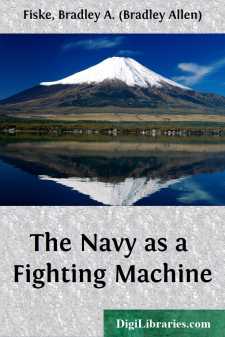Categories
- Antiques & Collectibles 13
- Architecture 36
- Art 48
- Bibles 22
- Biography & Autobiography 813
- Body, Mind & Spirit 142
- Business & Economics 28
- Children's Books 17
- Children's Fiction 14
- Computers 4
- Cooking 94
- Crafts & Hobbies 4
- Drama 346
- Education 46
- Family & Relationships 57
- Fiction 11829
- Games 19
- Gardening 17
- Health & Fitness 34
- History 1377
- House & Home 1
- Humor 147
- Juvenile Fiction 1873
- Juvenile Nonfiction 202
- Language Arts & Disciplines 88
- Law 16
- Literary Collections 686
- Literary Criticism 179
- Mathematics 13
- Medical 41
- Music 40
- Nature 179
- Non-Classifiable 1768
- Performing Arts 7
- Periodicals 1453
- Philosophy 64
- Photography 2
- Poetry 896
- Political Science 203
- Psychology 42
- Reference 154
- Religion 513
- Science 126
- Self-Help 84
- Social Science 81
- Sports & Recreation 34
- Study Aids 3
- Technology & Engineering 59
- Transportation 23
- Travel 463
- True Crime 29
The Navy as a Fighting Machine
Categories:
Description:
Excerpt
CHAPTER I
WAR AND THE NATIONS
Because the question is widely discussed, whether peace throughout the world may be attained by the friendly co-operation of many nations, and because a nation's attitude toward this question may determine its future prosperity or ruin, it may be well to note what has been the trend of the nations hitherto, and whether any forces exist that may reasonably be expected to change that trend. We may then be able to induce from facts the law which that trend obeys, and make a reasonable deduction as to whether or not the world is moving toward peace. If we do this we shall follow the inductive method of modern science, and avoid the error (with its perilous results) of first assuming the law and then deducing conclusions from it.
Men have always been divided into organizations, the first organization being the family. As time went on families were formed into tribes, for self-protection. The underlying cause for the organization was always a desire for strength; sometimes for defense, sometimes for offense, usually for both.
At times tribes joined in alliance with other tribes to attain a common end, the alliance being brought about by peaceful agreement, and usually ceasing after the end had been attained, or missed, or when tribal jealousies forbade further common effort. Sometimes tribes joined to form one larger tribe; the union being either forced on a weaker by a stronger tribe, or caused by a desire to secure a strength greater and more lasting than mere alliance can insure.
In the same way, and apparently according to similar laws, sovereign states or nations were formed from tribes; and in later years, by the union of separate states. The states or nations have become larger and larger as time has gone on; greater numbers, not only of people but of peoples, living in the same general localities and having hereditary ties, joining to form a nation.
Though the forms of government of these states or nations are numerous, and though the conceptions of people as to the purposes and functions of the state vary greatly, we find that one characteristic of a state has always prevailed among all the states and nations of the world—the existence of an armed military force, placed under the control of its government; the purpose of this armed force being to enable the government not only to carry on its administration of internal matters, but also to exert itself externally against the armed force of another state.
This armed force has been a prominent factor in the life of every sovereign state and independent tribe, from history's beginning, and is no less a factor now. No instance can be found of a sovereign state without its appropriate armed force, to guard its sovereignty, and preserve that freedom from external control, without which freedom it ceases to exist as a sovereign state.
The armed force has always been a matter of very great expense. It has always required the anxious care of the government and the people. The men comprising it have always been subjected to restraint and discipline, compelled to undergo hardships and dangers greater than those of civil life, and developed by a training highly specialized and exacting....


